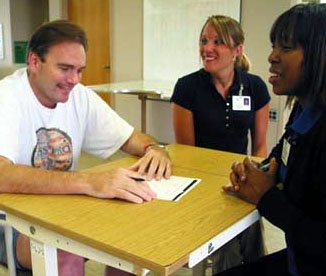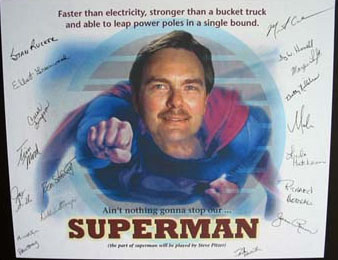JACKSON, Miss.—“A cascade of little miracles.”
That’s how Debbie Pitzer of D’Iberville describes the series of events that helped her husband Steve survive a massive heart attack on a Gulf Shores golf course.
She knows so many things could have gone dead wrong.
The electrical engineer could have suffered the attack while alone in his hotel room. Instead, he was in a crowd of co-workers from Coast Electric Power Association. The group included company safety director Clement Ladner, whose CPR skills kept Steve alive until an ambulance arrived.
At the hospital, Steve could have faced delays, but fate was in his favor once again. A cardiovascular surgeon and anesthesiologist were waiting at Thomas Hospital in Fairhope, Ala., and they quickly began lifesaving bypass surgery.
When it came time for rehab, Steve also could have settled for an outpatient clinic that did general therapy for cardiac patients. But Debbie – a nurse for 30 years – knew he needed specialized therapy if he were to overcome neurological injuries caused by lack of oxygen to his brain.
So when a Lucedale family told the Pitzers how Methodist Rehabilitation Center in Jackson had helped their two children overcome brain injuries sustained in a car crash, Debbie pushed for a transfer to the hospital’s nationally recognized brain injury program.
“It had always been my plan for him to have aggressive neurological rehab as soon as he was medically able,” she said. “I wanted him to have every chance for a full recovery.
“Two weeks after he got to Methodist Rehab, he was eating, he was walking and he had begun to make great strides. In the last weeks, his progress has been phenomenal.”
Those closest to Steve expected the 46-year-old manager of engineering and operations for Coast Electric to triumph over his injuries.
“He is pretty strong-willed,” said Ladner. “Whatever forces it takes, Steve knows how to do it.”
That forcefulness was in full bloom after Hurricane Katrina, as Steve helped lead an exhausting effort to repair some 5,000 miles of damaged power lines and over 30,000 broken utility poles.
But after a month in ICU, Steve was hardly the man whose steely determination had inspired co-workers to fashion a get-well card with his face atop Superman’s body. Recurring bouts of pneumonia and sepsis had whittled 40 pounds off Steve’s 6-foot-4-inch frame and turned his strong stride into a bent-over shuffle.
But that wasn’t the worst of it. The normally quick-witted engineer also suffered what he now calls “this fog feeling in my brain.”
He was so foggy, in fact, that he couldn’t even recall the month he spent marshalling much of Coast Electric’s hurricane recovery efforts. “I still can’t believe he doesn’t remember anything about Katrina,” marvels Ladner.
While such memory gaps can be mind-boggling to friends and loved ones, they are to be expected after brain injuries caused by oxygen deprivation, said Dr. Risa Nakase-Richardson, a neuropsychologist at Methodist Rehab.
“The most common impairment we see with anoxic or hypoxic brain injuries is memory problems – especially remembering new information day to day,” she said.
When Steve first arrived at Methodist Rehab, “he was three years off on his age and he had a hard time remembering what he had for breakfast,” said speech therapist Andrea Lowrie.
To overcome his deficits, Steve devoted his days to a full schedule of therapy. In addition to working with Lowrie on improving his logic, sequencing and memory skills, Steve met with physical and occupational therapists to focus on his strength, endurance and independent living skills. Even card games and puzzle sessions with therapeutic recreation specialist Tonjala Averett were opportunities to improve his cognitive abilities.
After weeks of hard work, Steve said his haze began to lift. “I feel a lot sharper,” he says. But as he readied to leave Methodist Rehab and head back home, his mind was on making more gains. “The last two weeks have been just a tremendous increase and if I can keep that going I feel like I can recover,” he said. “My goal is to get back 100 percent physically and mentally. I want to get everything back to where I feel I was.”
His co-workers are hoping he’ll succeed, because as his secretary Lynn Brown can attest: Steve’s the kind of guy you count on in times of need.
“We’ve had people comment that they hope and pray Steve recuperates before another hurricane comes our way,” she said. “We know if Steve is at the helm, everything is going to be all right.”


